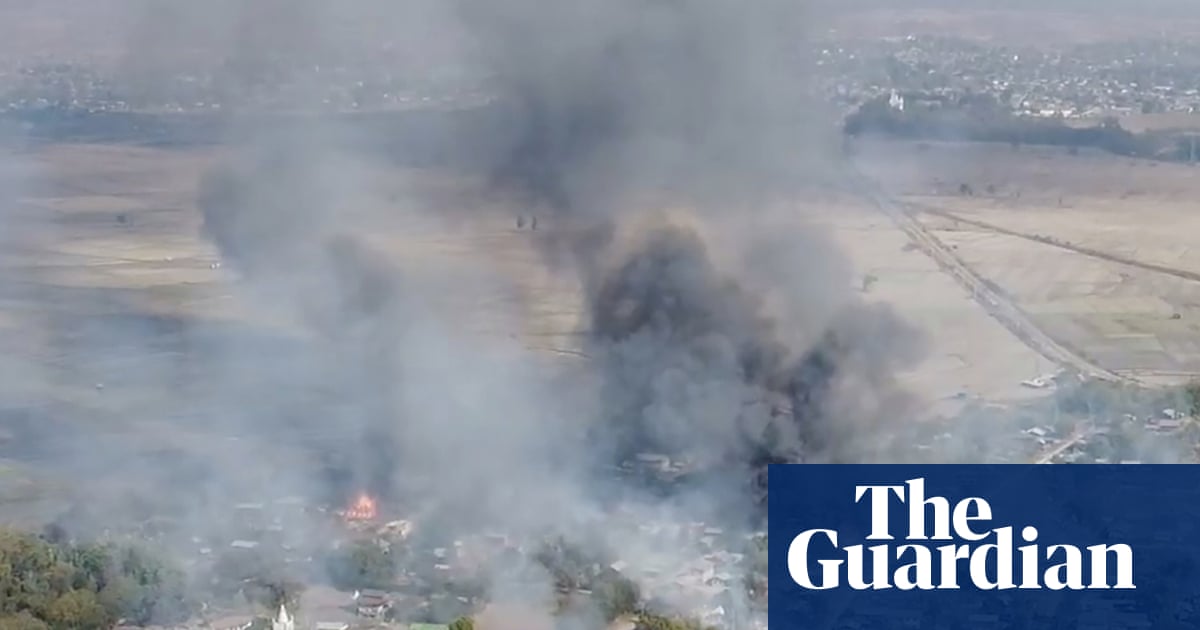
Myanmar’s military is using advanced European technology to protect its drone fleet as it carries out brutal aerial campaigns, research suggests, prompting calls for sanctions against the junta to be tightened.
Myanmar’s military, which has been widely condemned for its indiscriminate attacks against civilians, obtained “anti-jamming” technology made in Europe through a Chinese company, according to a report by Conflict Armament Research (Car).
Its researchers documented downed military drones in Kayah state in the country’s east which had been fitted with advanced navigation modules that protect the drones from jamming and signal spoofing. It had also seen evidence of similar technology used in Chin state, near the country’s western border.
There had been efforts to weaponise these unmanned aerial vehicles by fitting release mechanisms under the frame, Car said.
Myanmar has been gripped by conflict since the military seized power in a coup in 2021, provoking an armed resistance made up of anti-junta groups and older ethnic armed groups, which have succeeded in taking control of vast areas of the country’s borders.
Over the past 12 months the junta has invested heavily in drone technology in an attempt to catch up with opposition groups, which have made effective use of such weaponry. Myanmar now ranks third globally for the number of drone events, according to the Armed Conflict Location and Event Data project, which tracks conflicts around the world – behind only Ukraine and Russia.
Myanmar has been subject to an EU arms embargo in various forms since the early 1990s. Sanctions were widened in 2018 in response to military abuses against minorities, including the Rohingya. Further restrictions were imposed after the 2021 military coup.
Campaigners, however, say sanctions are not wide-ranging enough, and that measures are inconsistent across the EU, as enforcement falls to individual member states.
Yadanar Maung, spokesperson for Justice For Myanmar, said she was unsurprised by Car’s findings. “This is part of a pattern that has seen exports of communications equipment, spyware, UAV [unmanned aerial vehicle] parts, aircraft and the propulsion system for the navy’s biggest warship,” she said.
“None of these should have been transferred and, without rigorous enforcement by member states, companies will continue to do business with junta arms brokers with impunity,” Yadanar Maung added. “The EU also needs to expand its sanctions to effectively block the junta’s access to funds, arms and aviation fuel, in coordination with its allies.”
Robert Hunter Perkins, Car’s head of research, said drone warfare posed a particular challenge for policy makers as it was a rapidly developing field. “Offerings on the commercial market are far more advanced than a few years ago. It’s hard for industry innovations to be in total lockstep with national, and certainly international, controls.”
Car’s report does not name the manufacturer that produced the anti-jamming technology, or the European country in which it is based. Perkins said the manufacturer had made every effort possible to prevent misuse of its product, which, though sensitive, was not considered either a military or dual-use good and therefore not subject to controls.
The manufacturer shipped its products to a vetted distributor, based in China, in March 2023. The distributor then sold the product onwards as part of a much larger shipment, to another China-based company that integrates components into UAVs. In March 2024, the product integrator then sold the goods on to a company based in Ruili, an important trade hub on the border between China and Myanmar.
There is no evidence of wrongdoing by the distributor and the product integrator, though Car researchers say the location of the end-user company, based on the border where there had been an escalation in conflict, could have been a red flag.
“What is important to take away from this investigation is how to use the information that investigators like Car collects in conflict zones: capturing these red flags, alerting the manufacturers and trying to prevent future diversions,” Perkins said.
Its report said there was a need for sustained monitoring to ensure sanctions were effective.







